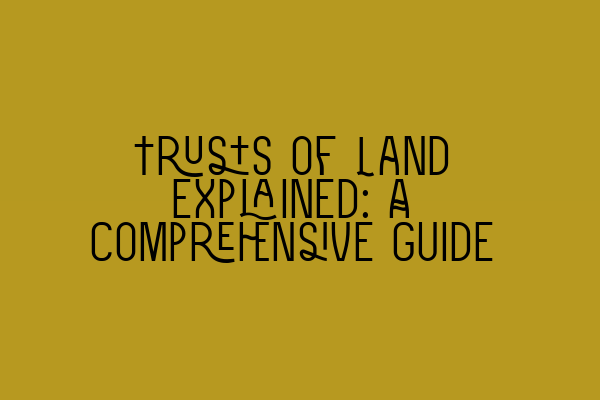Trusts of Land Explained: A Comprehensive Guide
Welcome to our comprehensive guide on trusts of land. In this blog post, we will cover all the essential information you need to know about trusts of land, including their definition, types, formation, and legal implications. Whether you are a property owner, solicitor, or simply interested in land law, this guide will provide you with a detailed understanding of trusts of land.
Before we dive into the details, let’s start with the basics.
What is a trust of land?
A trust of land refers to a legal arrangement where the ownership of land is split between two separate entities: the legal owner(s) and the beneficiary(ies). The legal owner(s) holds the property in trust, while the beneficiary(ies) have a beneficial interest in the land. This dual ownership structure allows for greater flexibility in managing and distributing the property.
Types of trusts of land:
1. Express Trusts: These trusts are created intentionally and explicitly through written or oral agreements. Express trusts can be further categorized into two types:
– Bare Trusts: In a bare trust, the legal owner(s) holds the property for the exclusive benefit of the beneficiary(ies). The beneficiary has complete control over the property and can instruct the legal owner(s) on its management.
– Fixed Trusts: In a fixed trust, the beneficial interests are predetermined and fixed. The trust deed will outline the specific shares of each beneficiary, which cannot be changed without their consent.
2. Resulting Trusts: Resulting trusts arise when the legal owner(s) retains a share or interest in the property after the initial transaction. This may occur in situations where the intended beneficiary fails to take full ownership of the property.
3. Constructive Trusts: Constructive trusts are imposed by the court to prevent unjust enrichment or rectify breaches of trust. They are not created by express agreement but by the operation of law.
Forming a trust of land:
Trusts of land are formed through a valid declaration of trust, which can be written or oral. However, it is highly recommended to have written evidence to avoid potential conflicts or disputes. The declaration of trust should clearly identify the legal owner(s), the beneficiary(ies), and the terms of the trust.
Legal implications of trusts of land:
Trusts of land have several legal implications that both the legal owner(s) and the beneficiary(ies) should be aware of. Here are a few key points to consider:
1. Trustees’ duties: The legal owner(s), or trustees, have a fiduciary duty to act in the best interests of the beneficiaries. They must manage the property responsibly and in accordance with the terms of the trust.
2. Beneficiaries’ rights: The beneficiaries have the right to receive a fair share of the property’s income and proceeds. They may also have the right to occupy the property, depending on the terms of the trust.
3. Trustee’s powers: The trustees have the power to make decisions regarding the trust property, such as selling, mortgaging, or leasing it. However, these powers are subject to the terms of the trust and the trustees’ fiduciary duties.
4. Disputes and resolutions: Disputes may arise between the legal owner(s) and the beneficiaries regarding the management or distribution of the trust property. These disputes can be resolved through negotiation, mediation, or litigation if necessary.
In conclusion, trusts of land provide a flexible and efficient way to manage and distribute property ownership. Whether you are considering creating a trust of land or involved in a dispute related to one, understanding the fundamental principles and legal implications is crucial.
We hope this comprehensive guide has provided you with a clear understanding of trusts of land. For further resources and preparation materials for the SQE exams, check out our related articles:
– SQE 1 Practice Exam Questions
– SQE 1 Practice Mocks FLK1 FLK2
– SQE 2 Preparation Courses
– SQE 1 Preparation Courses
– SRA SQE Exam Dates
If you have any further questions or require professional assistance with trusts of land, please don’t hesitate to contact us at SQE Property Law & Land Law. Our expert team of solicitors is ready to support you with your property and land law matters.
